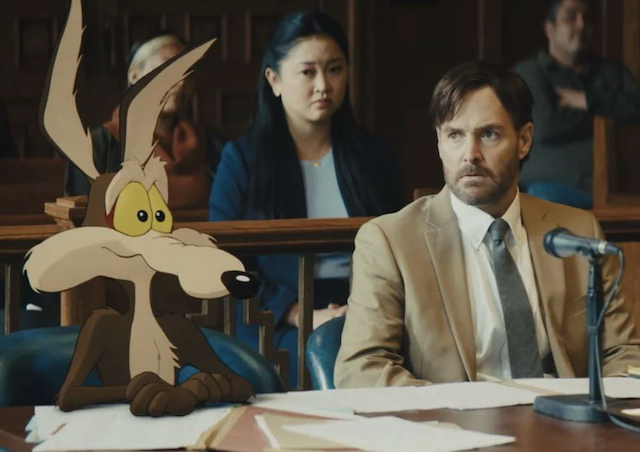
© Warner Bros. Discovery
Coyote vs. Acme may never be released, as Warner Bros. Discovery has refused all offers from other studios and streamers for the feature’s distribution rights, according to The Wrap. The news of the movie’s potential permanent shelving follows reports from last year that state it written off for tax purposes at the production company.
After Warner Bros. Discovery’s announcement last year, fans and filmmakers expressed their disappointment on social media, and demanded the feature be distributed. When the studio then announced that the movie, which includes elements of live-action and animation, was getting shopped, executives also declared that the project would be released this year. But now the comedy is back in danger of being permanently shelved.
Coyote vs. Acme producer Chris DeFaria was reportedly told by a Warner Bros. Discovery executive last month that the studio now just wants to “get this behind them.” Leaders in the company allegedly want to quietly “close the books” on the film’s potential release.
As a result, the movie may even be officially canceled before the company’s fourth quarter earnings call, which is scheduled for Feb. 23. But to avoid further outcry from the public, studio executives may not even publicly address the comedy’s fate.
Such streamers as Netflix and Amazon had shown interest in picking up Coyote vs. Acme. Paramount had also shown interest in releasing the film in theaters after screening it. The companies had even submitted substantial offers for the rights to the movie.
However, Warner Bros. Discovery was reportedly looking for $75-80 million payout for the rights to the comedy, which cost $72 million to make. The payout would double the $35-40 million they’d make from the tax write-down it received. But none of the offers were at that level, and the studio didn’t accept any counter-offers.
The new report added that the four Warner Bros. executives who canceled the film’s release haven’t actually watched the final cut of the comedy. Those executives are believed to include CEO and Warner Bros. Discovery president David Zaslav, along with Warner Bros. Pictures Animation president Bill Damaschke and Warner Bros. Motion Picture Group CEOs Michael De Luca and Pam Abdy.
Damaschke reportedly saw an early preview, while De Luca and Abdy saw a director’s cut. But Zaslav never watched any cut of the film.
Coyote vs. Acme was green-lit by a previous group of executives at Warner Bros. Zaslav had no part in making the movie. He and his fellow executives have said the comedy’s cancellation is due to a shifting “global strategy to focus on theatrical releases.”
Coyote vs. Acme had performed very well with viewers with its test screenings. It even garnering comparisons to such hit films as Who Framed Roger Rabbit? and Barbie. Unfortunately, those test screenings may be the only times that the comedy will have ever been watched by audiences.
Coyote vs. Acme is based on the character Wile E. Coyote and the Acme Corporation from the Looney Tunes and Merrie Melodies series of cartoons. In the movie, every product made by the Acme Corporation has backfired on Wile E. Coyote in his pursuit of the Road Runner. As a result, Wile E. hires a human attorney to represent him in his lawsuit to sue the company.
The film adaptation was penned by Oscar-nominated May December screenwriter Samy Burch, directed by Dave Green and produced in part by James Gunn. Will Forte played Wile E. Coyote’s lawyer, while John Cena starred as the Acme Corporation’s lawyer.
“For three years, I was lucky enough to make a movie about Wile E. Coyote, the most persistent, passionate, and resilient character of al time,” Green posted on X (formerly Twitter) in response to the comedy’s cancellation. “I was surrounded by a brilliant team, who poured their souls into this project.”
Steven Price, who wrote the score for the movie, also expressed his disappointment over the project’s cancellation on X. He said he “had a lot of fun scoring Coyote Vs Acme.” He also called the decision to cancel the film “bizarre anti-art studio financial shenanigans.”

